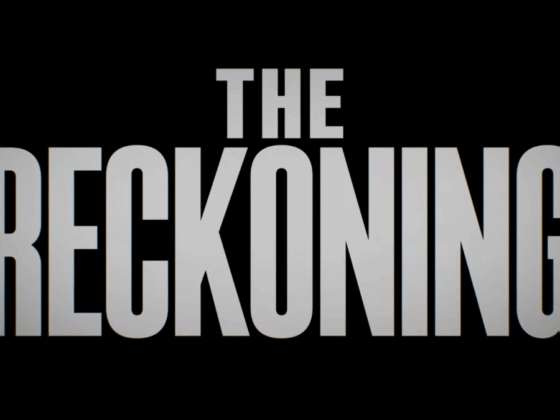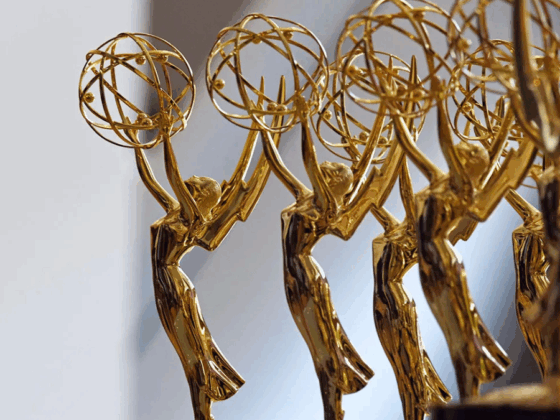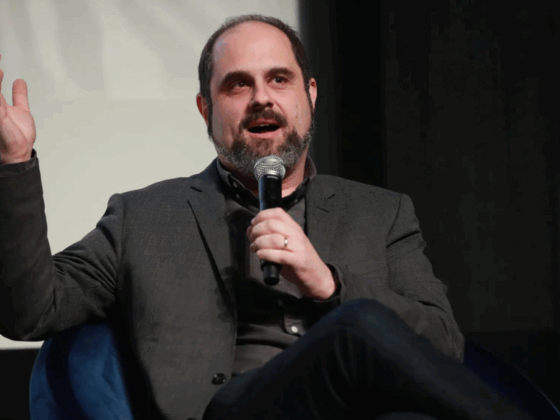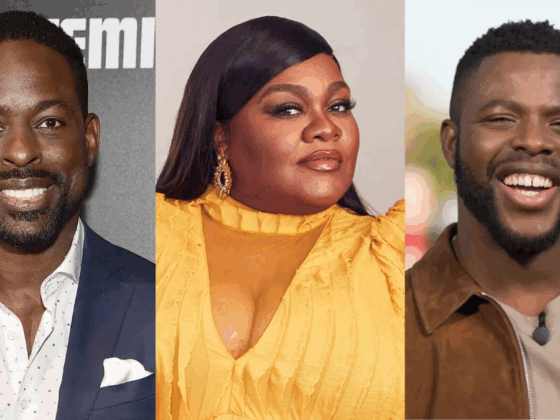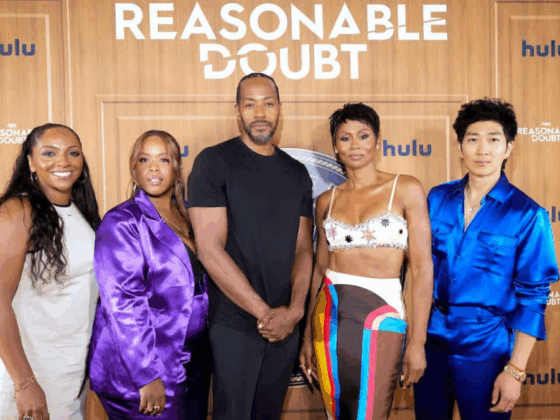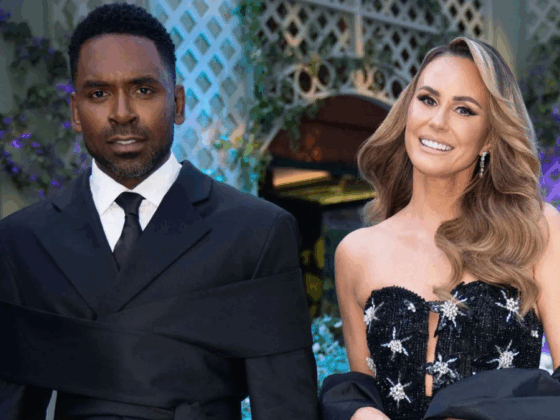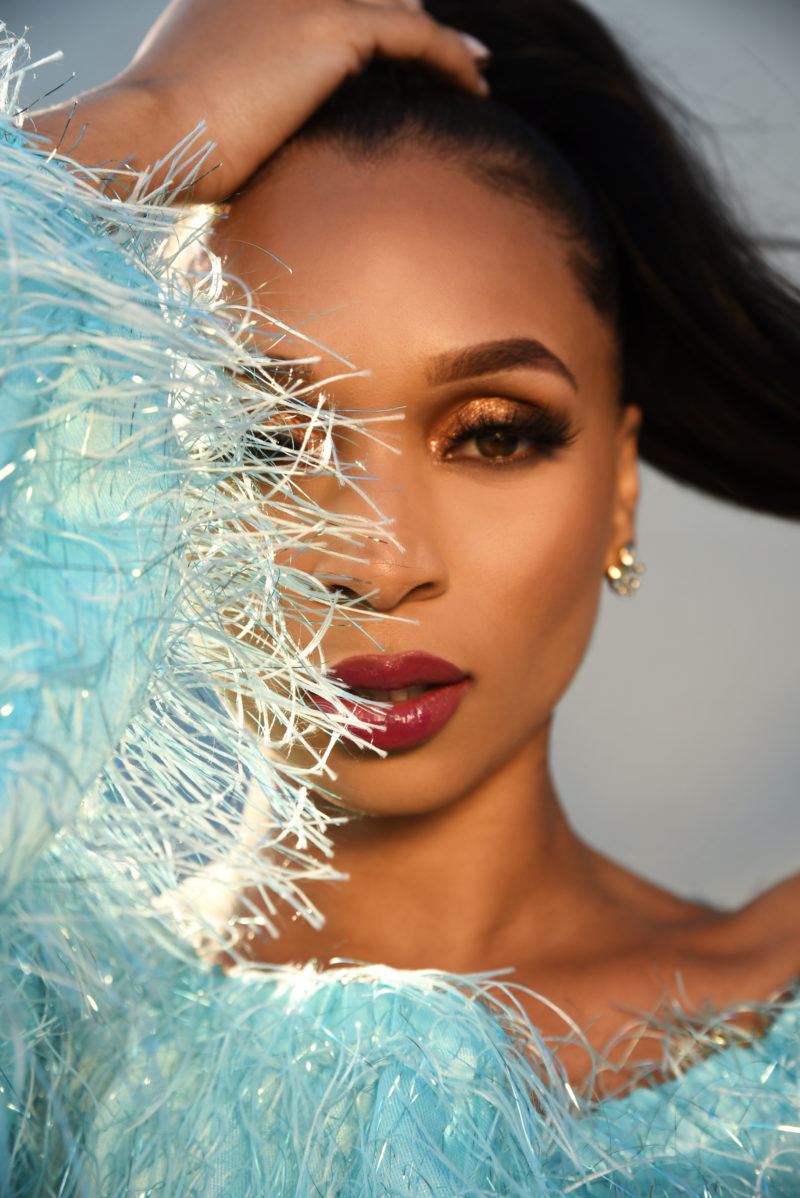
As defined by Merriam-Webster’s Dictionary, work ethic is a set of values centered on the importance of doing work and reflected especially in a desire or determination to work hard. As defined by actress Melissa L. Williams, work ethic is the ability to balance multiple jobs while pursuing your dreams. Not long ago, Williams worked in a restaurant in California as she pursued her dreams as an actress. In 2020, she is now the lead in Tyler Perry’s BET+ series, Ruthless. The Oklahoma City native sits down with our Culture Editor, Ryan Shepard, to talk about her college days at Clark Atlanta University, working with Tyler Perry and her childhood roles in productions such as Little Shop of Horrors.
Ryan Shepard: To bring everything full circle, Palm Sunday took place not long ago and Easter took place on April 12, 2020. Growing up, you had some of your earliest acting experiences performing in plays on Easter at church. What motivated you to take part in those plays and what lessons did you take away from being in them?
Melissa L. Williams: As an impressionable, aspiring actress, those experiences were priceless because I got to watch professionals do what they do best, which is their craft and performance. I was an extra in those plays, but I did gain a lot from watching and observing. It just really opened up my mind to the world of entertainment and showed me that it was a possible career path at a young age. Being cast as an extra just kept me in high spirits and showed me that I could one day do the same thing. I think that’s why I was never weary on the journey because, from a young age, I got that approval. Then, I kept auditioning for things and getting cast from then on. I think those moments were priceless because those were my driving forces in starting my career off. It was the church plays.
In addition to participating in plays at church, you took part in productions around your hometown of Oklahoma City. Most notably, you were a part of a production of The Little Shop of Horrors and a few other plays that involved music. Being that you had the opportunity to take part in those productions, how important was music to your development as an actress?
In every great movie, I bet you can remember the song or the score. [Sings the Star Wars theme song]. Everybody knows what that is and I’m not saying any words. That’s how powerful music is.
With my first plays being musical plays like the Easter play, singing was always involved. Then, all of the plays that I did after that including Little Shop of Horrors included singing. I just realized that if I continue the practice of singing, I cannot only be a singer, but I can also be a Broadway star. One of my goals is to be on Broadway and win a Tony, so singing went hand in hand with acting. For entertainment, it also goes hand in hand. Pairing anything you watch visually with something great like music is always going to keep fans engaged. You can sing any song or mimic a beat from your favorite movie because it’s that powerful.
Outside of your early career aspirations, you were also the oldest sibling in a family of six. I can only relate so much because I’m the youngest of two. What was it like to grow up in a family of that size with your brothers and sisters around?
That is actually something that I am so grateful for. I didn’t grow up with all of my brothers and sisters because my parents were divorced, but I was around them. I would go visit my Dad and see my other brothers and sisters. Then, I lived with my Mom and my two younger sisters before leaving for college. We have always had a huge family. I grew up with my cousins, aunts and extended family more so than all of my brothers and sisters necessarily.
My family has always been a supportive and encouraging part of my life that I will cherish. Families are important. Big families are important. Family structure is important and it starts with love. Mine is based on love.
Speaking of those talent shows, do you have members of your family involved in your art now?
Honey, you know I did. I hired all of them. I came back home. My Mom has all the videos of me.
I was doing music in Atlanta before I moved to California and I opened for Trey Songz and Bobby Valentino. For that show, my sisters and my cousins were my backup dancers and they’re in that video. I had to FaceTime them, show them the video and say, “Girl, can you believe you were dancing for me and we were opening up for Trey Songz?” This is our history. That’s what happens with big families. They get to ride with you much like Solange did with Beyonce, Ashley Simpson did with Jessica Simpson and the list goes on and on.
It’s great that you mentioned Bobby Valentino because he attended Clark Atlanta University. After leaving Oklahoma City, you traveled to Atlanta to attend Clark Atlanta University. The AUC is a special place for me because my brother attended Morehouse College. One of the things that I believe gets overlooked about the AUC is that it produces a lot of talent in the film and entertainment industry. Spike Lee, Keisha Knight Pulliam, Samuel L. Jackson, Shaun Robinson, Bomani Jones and the list goes on. What led you to attend Clark Atlanta University and what were some of your most rewarding experiences there?
It’s an actually sweet, but embarrassing story. I’m from Oklahoma, so have you seen the Tiger King series yet?
Yes, I just finished watching it the other day. It was wild.
Basically what I’m trying to say is that I had to get out of here. I saw the movie Drumline and it gave me my first AUC experience without Atlanta or being around college life. I was in high school, looking at different colleges and my Mom wanted me to go to Baylor, but when I saw that movie I knew I wanted to go to that school. I literally thought Atlanta AT&T was a real school. I told my Mom that I’m going to the school on Drumline. Then, I looked it up and they told me that it wasn’t a real school, but it was filmed at the AUC. There began the digging and I applied to Spelman and Clark Atlanta. From there, I got accepted to Clark. Thank you Nick Cannon. I wanted to be around Black culture. I wanted to be around emerging talent. That’s what I took away from that movie. That’s a classic movie to me.
“I want to make sure people know that work ethic is important and I did not get to this point overnight.”

First, you’re not the only person who thought that. I thought Atlanta AT&T was a real school for a long time.
See? They probably had a lot of people looking it up. Where’s the application? How can I apply?
As you mentioned previously, you decided to go to Clark Atlanta in part because you wanted to experience a new place and have your own experiences. After you graduated from Clark Atlanta, you stayed in Atlanta for a bit and pursued music. You opened for Trey Songz, Bobby Valentino and a few others. What was the transition like from college into becoming a full-time musician and how did you balance your music career with your acting career?
I had already had an acting background. As for my singing background, I didn’t really have an R&B or Hip-Hop background. I had more of a musical theater background, but when you’re trained, you can do different genres. I was rapping and doing R&B in Atlanta. It wasn’t a hard transition because the stage is the stage. You come alive when you get on stage, performing your song or letting people hear your song.
I just think that if that’s one of your passions that you should do that and share it with people. That’s why I’m so excited about my music because it’s something that people that don’t know me very well are going to be surprised by.
Going from Atlanta, you made the move to Los Angeles. In just a few years, you went from Oklahoma City to Atlanta to Los Angeles. What was the biggest challenge in transitioning from Atlanta to Los Angeles?
Well, first of all, I embraced the reality that it’s not going to happen overnight. You move to California and think to yourself, “I did it. I’m here, right?” That’s not it. There’s a lot of hard work that’s involved and it’s not all just being an actor. You’ve got to have jobs, like jobs with an “s”. When you’re a young, aspiring singer, actor, etc. and you move to California, chances are that your dreams are wide and open and think that things are going to happen overnight. I want to make sure people know that work ethic is important and I did not get to this point overnight.
You mentioned that you had taken on a lot of different jobs and roles. You first made your way on to BET through The Game. How did you land that role?
The Game actually came through this site called Actors Access. It’s where actors and agents submit their talent to casting directors and their projects. I didn’t have professional headshots, but I did upload what I did have. I saw that they were casting for The Game and I sent my picture.
Basically, I prayed and I got the audition. I found the site that actors were using to send their headshots. I found out that is where you can find out about new castings. I would just go on there, submit and things like The Game would come up. That’s how I got my first audition.
I had to fly back to Atlanta to audition because obviously they didn’t know I was in Atlanta. I also didn’t know too much about sharing or asking, “I’m actually in L.A., can I do a self tape?” I don’t even think self-tapes were an option at that time, so I had to find money to get to Atlanta just to audition for it. Then, I found out when I went back to L.A. that I got the role. They told me that they wanted me to be Jasmine. It was all trial and error, but the trial part was most important.
Interestingly enough, you left Atlanta to go to Los Angeles, only to come back later on. Starting with The Game, you have now been on BET with multiple Tyler Perry productions like The Oval and now Ruthless. A few months ago, I noticed that you posted a picture of you and your father at his Gospel luncheon. In that post, you thanked him for the opportunity to be a part of it. What has it been like to work with Tyler Perry and what is your relationship like with him?
It has been a rewarding experience working with him because I found out that like myself, he believes in a strong work ethic. I mean he has the largest studio right now. It’s great to have the inside look at how he does things and treats people kindly. Regardless of whether it was onset, offset or at lunch, it was a rewarding experience because he is a role model for me and for many. I get to be up close and personal with my role model. He also texts me and tells me things about the show and feedback that he’s getting. He doesn’t have to do that, but he does and I respect him for that.
Working with Tyler Perry, you are now playing the role of Ruth in Ruthless. In the series, Ruth takes her daughter and exposes her to a cult. As an actress, how do you mentally prepare for that type of role?
You definitely need to be open because I had no idea when Tyler Perry hit me up about the role. I didn’t know what the show was going to be about because he hadn’t written it yet. He told me it would be a wild ride and it’s going to be fun. I told him that I’d do it, but then I began to understand how serious it was when they had me watch a couple of documentaries. It was informative for me as well because I don’t look up things about cults in my free time.
You get in that mindset by doing your research because once you do that you take the judgment away. You can also empathize with the person because these are real people. Our show is a show, but there are people that are going through these things or have gone through these things. I think the focus becomes, doing the character justice and bringing their story to light. I focus my attention on the mission of it all rather than the fact that it’s dark.
I was interested in learning how you manage your relationships with other members of the cast when you’re dealing with dark material like that. How do you turn off the relationships you have with cast members and turn on the friendships that you may have with them off-screen?
That is a great question. There are times when there would be a scene that was so serious where I’d have to say, “I can’t laugh right now,” and people understood that. People would let you get in your space. For the most part, when cut happened we’re joking only because it’s such a serious subject and sensitive material that if you don’t, you could get caught in the energy and it could become negative. That’s already contagious. With Tyler Perry knowing that it was sensitive material, he’s always checking in on us. He’s always checking in and giving us wonderful compliments. It’s more of a working environment than focusing in on the darkness of it all. Like any working environment, after the work is done it’s fun.
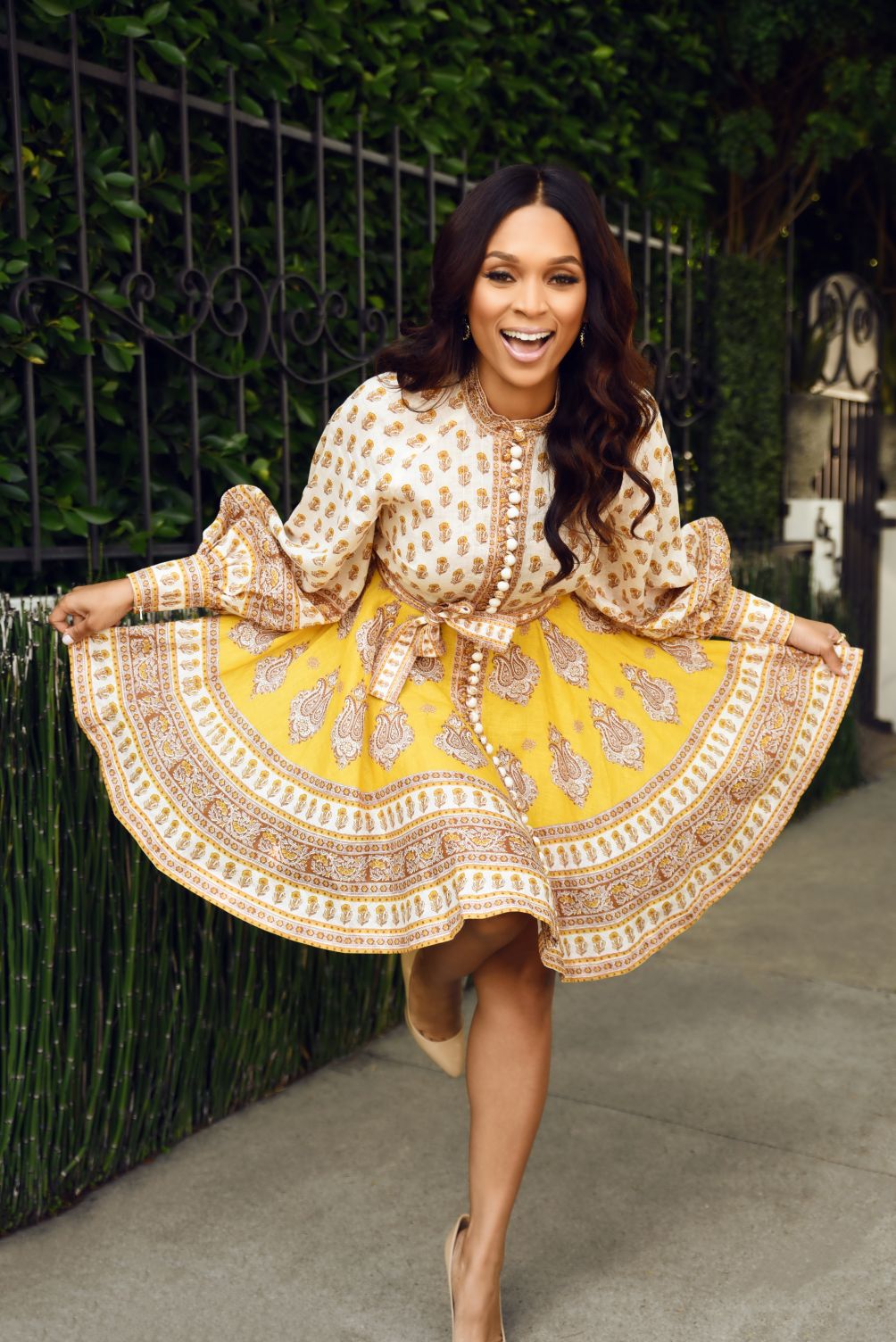
Outside of your work on the show, you did something incredible the week of its debut. You gave away hundreds of dollars to fans that needed the money to buy supplies during this pandemic. With everything that’s going on, I’m sure you had tons of people asking for assistance. What led you to do that and how did you determine who to give to?
I had experienced a really nice act of kindness from someone and I still don’t know who it is. That’s just how random it was. They just left a whole roll of toilet paper. This is a time when people are fighting people over toilet paper and this person left a whole roll with a sign that said if you need one, please take one. That was so thoughtful. This new reality for me is just that, it’s new.
I didn’t give based on people’s stories because unfortunately, some people fabricate their stories. I just made an announcement and said that I’m going on my live [Instagram] in 30 minutes. I didn’t say why, so I wouldn’t get people with the wrong intention. I just went on there and started telling my story of how I used to work in a restaurant. Then, I said I’m going to give to the first ten people that hit me up. I’m not going to tell you how much, but I’m going to give you money for groceries.
That is definitely a great thing that you did because I had an experience similar to the one you mentioned about people fighting over toilet paper. I was in the store about two weeks ago and somebody’s auntie or grandmother came up and took my cart because I had the last few cans of chicken noodle soup. I just ended up giving her mine because if you need it that badly you can have it.
Oh my gosh! See? That’s what I’m saying. It’s not that bad, but the fear is that bad. Therefore, people are doing things like fighting old ladies, pushing people out of the way or arguing over toys. What’s happening is that fear is what is spreading faster and it’s out of control.
I guess my last question or last two questions are related to staying inside. Outside of Ruthless, what are you watching and what music are you listening to now that you’re inside more?
Snoh Aalegra! I love that girl. Kehlani! Obviously, Drake just knows how to write a hit. The Toosie Slide, he knows how to make a hit. First, I was like let me turn this on and see what Drake did. Listen, I’m hooked on that song. Snoh Aalegra spins heavy on my playlist right now. Her song, “I Want You Around” with 6LACK is so dope.
6LACK is my favorite artist, so I definitely hear you on that. My last question is about your work moving forward. I know a lot of things are in limbo in film and Broadway, which is being hit a lot harder than people previously thought it’d be. Despite the uncertainty of the industry moving forward, are there any specific projects or people you’d like to work with moving forward?
That’s such a great question. Of course, I could spit out all the names of all of the people that I admire. You know what? This is a simple, but very accurate answer. Whoever God wants me to work with, I’ll be happy to work with. There are so many people I want to work with, but may not be in God’s will. Whoever God wants me to work with, that’s who I’ll be looking forward to working with. I have people that I admire, but I think that’s up to God.
